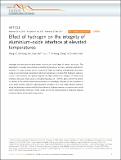Effect of hydrogen on the integrity of aluminium?oxide interface at elevated temperatures
Author(s)
Li, Meng; Xie, De-Gang; Ma, Evan; Zhang, Xi-Xiang; Shan, Zhi-Wei; Li, Ju; ... Show more Show less
DownloadEffect of hydrogen.pdf (736.3Kb)
PUBLISHER_CC
Publisher with Creative Commons License
Creative Commons Attribution
Terms of use
Metadata
Show full item recordAbstract
Hydrogen can facilitate the detachment of protective oxide layer off metals and alloys. The degradation is usually exacerbated at elevated temperatures in many industrial applications; however, its origin remains poorly understood. Here by heating hydrogenated aluminium inside an environmental transmission electron microscope, we show that hydrogen exposure of just a few minutes can greatly degrade the high temperature integrity of metal–oxide interface. Moreover, there exists a critical temperature of ∼150 °C, above which the growth of cavities at the metal–oxide interface reverses to shrinkage, followed by the formation of a few giant cavities. Vacancy supersaturation, activation of a long-range diffusion pathway along the detached interface and the dissociation of hydrogen-vacancy complexes are critical factors affecting this behaviour. These results enrich the understanding of hydrogen-induced interfacial failure at elevated temperatures.
Date issued
2017-02Department
Massachusetts Institute of Technology. Department of Nuclear Science and EngineeringJournal
Nature Communications
Publisher
Nature Publishing Group
Citation
Li, Meng; Xie, De-Gang; Ma, Evan; Li, Ju; Zhang, Xi-Xiang and Shan, Zhi-Wei. “Effect of Hydrogen on the Integrity of Aluminium–oxide Interface at Elevated Temperatures.” Nature Communications 8 (February 2017): 14564 © 2017 The Author(s)
Version: Final published version
ISSN
2041-1723